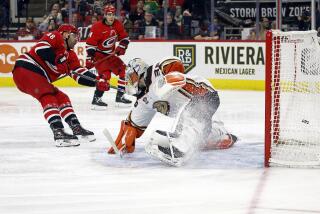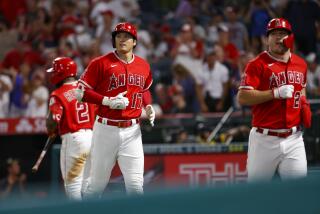Stormy Weather
RALEIGH, N.C. — The Carolina Hurricanes were a perfect storm last season. Champions of the weak Southeast Division and overlooked as the playoffs began, they rode a convergence of forces -- superb goaltending, timely scoring and a scarcity of injuries -- to the Eastern Conference championship and the franchise’s first berth in the Stanley Cup finals.
This season, unkind winds have buffeted them mercilessly and pushed them to the brink of playoff oblivion. Injuries have devastated their defense and depleted their depth up front, their offense has dried up and the once-invincible goaltending of Arturs Irbe and Kevin Weekes has shown cracks.
Their determination remains constant, but power-play goals and big saves aren’t. And no one knows where they went.
“I’m not looking for consolation prizes,” Irbe said last week, when asked if the team’s earnest effort in a 3-2 loss to Toronto was satisfaction enough. “It’s tough to explain how it could have happened. We are putting ourselves in such a big hole, it’s close to impossible to pull ourselves out.”
The Hurricanes, who play at Staples Center tonight and at Anaheim on Sunday, are 10 points out of eighth place and 13th in the conference, and they could be out of the race by the end of the four-game trip they began after the All-Star break. They’d be the first team to follow an appearance in the Cup finals with a non-playoff finish since the Washington Capitals lost in the 1997-98 finals and missed the playoffs in 1998-99.
“We passed panic a week or two ago. We’re right into urgency,” Coach Paul Maurice joked last week, before his team lost its last two games before the All-Star break. “Thirty games is not a lot of hockey. We’ve been in this dogfight for years.”
They’ve battled on every front since their birth in 1971 as the New England Whalers of the World Hockey Assn. Although they won the WHA’s first championship, they bounced from Boston to Hartford and briefly to Springfield, Mass., after the roof of the Hartford Civic Center collapsed in 1978. One of four WHA teams absorbed by the NHL in 1979, the Whalers played before loyal but small crowds in Hartford until Peter Karmanos, who had bought the club in 1994, engineered a move to the uncharted hockey territory of North Carolina in 1997.
They played in a minor league arena in Greensboro for two seasons until their new home in Raleigh was ready, averaging 9,108 fans their first season and 8,383 the next. They were a blip on a landscape dominated by college basketball, football and stock car racing until last season, when they began making inroads and filling the RBC Arena, which they operate and share with North Carolina State.
“College basketball is the big thing here in Carolina,” defenseman Bret Hedican said. “But I think once people have come to a game and witnessed it in person and taken out all the stereotypes of hockey players and the game of hockey, once they’ve seen it, they say, ‘This is spectacular. I want to see more.’ ”
And like fans everywhere, they warmed to winners, jumping merrily aboard the Hurricanes’ playoff bandwagon last spring.
Seeded third because they finished atop the Southeast -- their overall point total was seventh-best in the conference -- the Hurricanes eliminated the New Jersey Devils in six games for their first playoff series victory in Carolina and first for the franchise since 1986. They next beat the Montreal Canadiens in six games, another franchise playoff first. As the buzz surrounding them grew, they upset the Toronto Maple Leafs in the East finals before losing to the Detroit Red Wings in five games.
That playoff run boosted their season ticket sales by 3,000 to nearly 10,000, most held by individuals rather than corporations. Outreach efforts such as their Hockey 101 program -- fans sign up for lessons about the game and receive diplomas during an on-ice graduation ceremony -- seemed to solidify their footing in this foreign territory.
Their crowds, have generally been good, averaging 15,685 in the 18,730-seat arena this season. Fans start their own chants and get energized when the Hurricanes go on the power play, but they’ve been frustrated by the recent losses.
“We don’t have a lot of corporate headquarters here but we have a lot of businesses here that are very supportive of this team,” General Manager Jim Rutherford said. “And we don’t have a lot to compete with. There aren’t any other major league sports here....
“I think the future here is very solid. But with that being said, you have to have good team performance. You can’t take anything for granted. Team performance is the key in most cities and in sports.”
They started the season well enough and were 12-7-4-3 on Dec. 3, but they slipped into a 1-11-1-1 swoon and haven’t recovered. Injuries took a heavy toll. Special teams suffered.
“I don’t want to make excuses,” said Hedican, who was sorely missed while he was out 10 games, recovering from an inner-ear problem. “This time of year, if you look for excuses, you’re in trouble. We have to try to build from here.”
But without Rod Brind’- Amour, who led the team with 37 points when he suffered a wrist injury and underwent surgery last month, and rugged forward Erik Cole, who broke his leg just before the All-Star break, their chances of rallying are dim. Veterans Jeff O’Neill (19 goals, 40 points) and Ron Francis (19 goals, 36 points) can’t do it all.
“There’s learning curves to everything, and last year we learned a lot,” Rutherford said. “We learned how to win real tight games and we learned the discipline it takes to win the conference and go to the finals. The next part of that learning process is coming off a real long season with a lot of emotion and having a real short off-season and coming back not with the proper rest mentally and physically....
“Injuries have been a problem for us, and some guys have just not gotten back to the level they were at a year ago. Add those things up. It’s such a fine line between winning and losing in this league. Last year, we fell on the side of winning, and this year, we fell on the side of losing.”
Maurice, in his eighth season as the NHL’s longest-tenured coach, believes the short summer was a factor.
“But I don’t think it’s as severe as our record indicates,” he said with typical frankness.
“I think it’s a difference in how you take the wins and losses, the emotion of it. You win a game and you expect it. That’s a good thing. When we lost some games, I went back and watched, and we played pretty fine hockey and probably didn’t need to react, even I as a coach, with some of the anger that you show, and we probably could have just stayed the course. But you’re trying to raise the bar on your team, and those are areas that you have to raise the bar.
“Expectations of the team change and whether that’s right or wrong, maybe even the coach overreacted when they were giving what they had. When things go wrong it’s more tense. We’ve gone through that frustration. Somewhere in the back of your head, you think it should be easier.”
It hasn’t been. And it won’t get easier.
“It used to be, where you probably could pick four or five games in a month and say, ‘These are games we really should be able to win, even if we’re not firing on all eight cylinders.’ That’s not the case anymore,” Maurice said.
If there’s reason for hope, Rutherford said, it’s that teams vying for the last spots in the East are repeatedly beating each other, so the cutoff for making the playoffs might be low.
“The other point, and I make this point every year, is if you can get in, you can win,” he said. “All you’ve got to do is get the eighth spot and this team could go back to the finals if it gets in. Now we have the experience, we feel more comfortable with it. The big stuff would be getting in.”
Rarely has “if” been a more daunting word.
More to Read
Go beyond the scoreboard
Get the latest on L.A.'s teams in the daily Sports Report newsletter.
You may occasionally receive promotional content from the Los Angeles Times.







